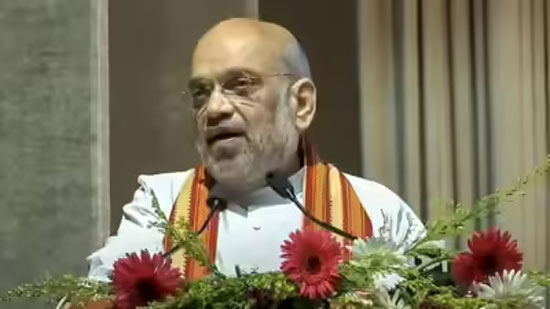Daijiworld Media Network - Gandhinagar
Gandhinagar, Sep 14: Union home minister Amit Shah marked Hindi Diwas with a strong pitch for expanding the role of Hindi beyond mere official communication. Addressing the Fifth All India Official Language Conference on Sunday, Shah said that Hindi should become an active vehicle for science, technology, law, justice, and police administration in India.
“Hindi should not remain confined to government files and formal communication—it must be the language of innovation, research, and governance,” he said, calling on institutions and states to embrace Indian languages more broadly in their operations.
He stressed that Indian languages, including Hindi, are not rivals but allies, and reiterated that using one's mother tongue strengthens national unity. “When work is done in Indian languages, it creates an automatic connection with the people,” Shah said, adding that this approach aligns with Prime Minister Narendra Modi’s vision of inclusive development through linguistic empowerment.

Reaffirming the Centre’s commitment to linguistic diversity, Shah invited Chief Ministers across the country to write to the Union Home Ministry in their native languages, assuring them of replies in the same language. He praised PM Modi’s efforts to promote regional languages on global platforms, citing his speeches at the UN, G20, and SCO in Hindi and other Indian tongues.
He highlighted the creation of the Bharatiya Bhasha Anubhag (Indian Languages Section), calling it a major step in making the Department of Official Language a more holistic and functional body. Shah also showcased Sarthi—a new software tool developed for seamless translation between Hindi and other Indian languages—as a key innovation to promote multilingual inclusion.
He offered Gujarat as a model of linguistic harmony, noting that while Gujarati is the native language, Hindi has thrived alongside it. Historical figures like Dayanand Saraswati, Mahatma Gandhi, and Sardar Vallabhbhai Patel, he said, played pivotal roles in promoting Hindi as a tool for national unity.
Shah also invoked the legacy of Chhatrapati Shivaji Maharaj, who he said championed Swaraj (self-rule), Swadharm (self-identity), and Swabhasha (mother tongue)—three elements he described as essential for preserving a nation's self-respect.
“Children lose up to 30% of their learning capacity if they are forced to study in a language other than their mother tongue,” he warned, urging parents to support learning in native languages.
Calling Sanskrit the fountainhead of Indian knowledge systems, Shah credited Hindi for bringing that wisdom into everyday homes. He concluded by stating that in India’s ‘Amrit Kaal’—the period leading up to the centenary of independence—Hindi and other Indian languages must play a central role in achieving cultural and intellectual self-reliance.
As Hindi completes 76 years as the official language and the Department of Official Language marks its golden jubilee, Shah called this a “renaissance era” for Indian languages and a time to truly make them the voice of the nation.